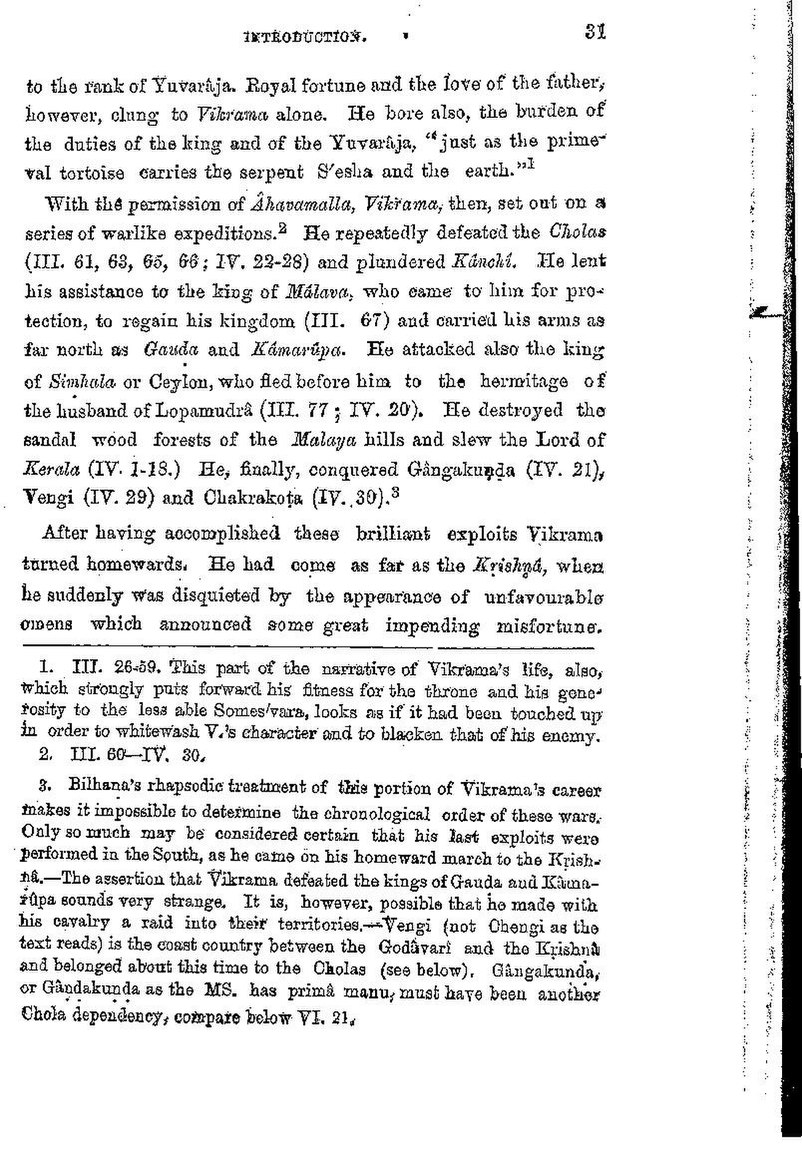INTRODUCTION.
31
to the rank of Yuvarija. Royal fortune and the love of the father,
however, clung to Fikrama alone. He bore also, the burden of
the duties of the king and of the Yuvaraja, "just as the prime-
val tortoise carries the serpent S'esha and the earth. "I
With the permission of Ahavamalla, Vikrama, then, set out on a
series of warlike expeditions. He repeatedly defeated the Cholas
(III. 61, 63, 65, 66; IV. 22-28) and plundered Kanchi. He lent
his assistance to the king of Málava, who came to him for pro-
tection, to regain his kingdom (III. 67) and carried his arms as
far north as Gauda and Kámarúpa. He attacked also the king
of Simhala or Ceylon, who fled before him to the hermitage of
the husband of Lopamudrà (III. 77; IV. 20). He destroyed the
sandal wood forests of the Malaya hills and slew the Lord of
Kerala (IV. 1-18.) He, finally, conquered Gângakuşda (IV. 21),
Vengi (IV. 29) and Chakrakota (IV. 30).
After having accomplished these brilliant exploits Vikrama
turned homewards. He had come as far as the Krishnd, when
he suddenly was disquieted by the appearance of unfavourable
omens which announced some great impending misfortune.
1. III. 26-59. This part of the narrative of Vikrama's life, also,
which strongly puts forward his fitness for the throne and his gene
rosity to the less able Somes/vara, looks as if it had been touched up
in order to whitewash V.'s character and to blacken that of his enemy.
2. III. 60-IV. 30.
3. Bilhana's rhapsodic treatment of this portion of Vikrama's career
makes it impossible to determine the chronological order of these wars.
Only so much may be considered certain that his last exploits were
performed in the South, as he came on his homeward march to the Krish-
nâ. The assertion that Vikrama defeated the kings of Gauda aud Kâma-
fupa sounds very strange. It is, however, possible that he made with
his cavalry a raid into their territories.-Vengi (not Chengi as the
text reads) is the coast country between the Godavari and the Krishna
and belonged about this time to the Cholas (see below). Gângakunda,
or Gândakunda as the MS. has primâ manu, must have been another
Chola dependency, compare below VI. 21,
पृष्ठम्:विक्रमाङ्कदेवचरितम् - बिल्हण.pdf/३५
एतत् पृष्ठम् अपरिष्कृतम् अस्ति

